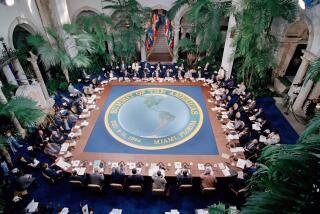Post-Geneva Letdown Feared : Gains at Summit Called Key to Reagan’s 2nd Term
- Share via
WASHINGTON — To avoid a post-summit letdown that could cripple the remainder of his presidency, White House political advisers say President Reagan needs to bring home three trophies from his meeting next week in Geneva with Soviet leader Mikhail S. Gorbachev.
They say they will consider the two-day session a success if Reagan secures a commitment from Gorbachev to a second summit, a statement on arms control that would spur the currently stalled negotiations and an agreement for a visible increase in “people-to-people” cultural exchanges. However, they do not believe Reagan has to nail down a specific arms agreement to win public approval.
“Americans are very realistic about what can and can’t be accomplished in these meetings,” said Republican pollster Richard B. Wirthlin. “While an overwhelming 8 out of 10 people support the idea of the meeting, they do not really expect any major breakthrough.”
On his last full day in Washington before leaving this morning for Geneva, Reagan met with Secretary of State George P. Shultz and spent an hour with the National Security Council in a final review of summit themes and expectations. One top official said it was “like Christmas Eve” because of the heightened mood of anticipation.
White House officials said that a joint appearance between Reagan and Gorbachev has been added at the end of their meetings in Geneva where agreements can be signed and progress reviewed.
Reagan also met with Sens. Pete Wilson (R.-Calif.) and Ernest F. Hollings (D-S.C.) to receive a letter signed by them and 37 of their Senate colleagues endorsing his Strategic Defense Initiative, the missile defense research program commonly known as “Star Wars.” The letter declared the program, aimed at an effective space-based anti-missile system, “too important to be traded for marginal improvements in the status quo.”
“Star Wars” is one of many sticking points as the superpowers have searched for areas of common ground before their top leaders convene for the first time in six years.
Despite the doubts that any substantial agreement on arms control will be reached, White House advisers believe the summit will “set the stage” for next year’s Senate elections if Reagan can ride the momentum coming out of Geneva to ease his transition to the nitty-gritty domestic issues that await him.
“The key word is progress, “ said one senior adviser, who stressed that hopes for peace kindled by the summit must be kept alive through the prospect of a future meeting and continued dialogue on arms control and regional issues. The summit, he warned, must not be seen as “the closing out of the Reagan presidency.”
Reagan’s Popularity
GOP polls show a sharp increase in Reagan’s popularity and in public confidence in his ability to deal with the Soviets since the White House embarked on its pre-summit “public diplomacy” campaign six weeks ago. Indeed, they show Reagan’s overall rating as eight percentage points higher than Dwight D. Eisenhower enjoyed at the same point in his second term.
But Reagan’s political advisers worry that unless a comparable public relations effort is mounted after he returns from Geneva, the President’s summit glow will fade, and he will once again become mired in no-win domestic issues.
“He’s got so many things that await him,” said one official, ticking off the raging battle over the federal deficit, a tax reform proposal that is floundering, serious political defections in the Farm Belt and an underlying concern that the economy may be on the brink of recession.
Democratic strategists argue that these issues--not arms control--will determine the outcome of the 1986 Senate elections, and pollster Paul Maslin said Republicans are “fooling themselves” if they expect a significant change in political attitudes because of the summit.
Political Ramifications
Administration officials said they would be happy if they could extract a general statement on arms control “guidelines” from Gorbachev. And at a recent briefing for reporters, Shultz put the odds of achieving even that no higher than 4 out of 10.
The history of summits bolsters the Democrats’ contention that little is to be gained politically from these high-visibility meetings. Studies indicate that the political benefit from the last nine summits conducted since World War II averages out to zero.
Even so, White House strategists believe the summit already has been an important turning point for Reagan. Early this year, he was widely criticized for not capitalizing on his 49-state mandate. His legislative program was drifting, and he was in danger of being perceived as a caretaker President.
Once he became engaged in the summit, said one senior adviser, it was “a night-and-day difference.”
More to Read
Sign up for Essential California
The most important California stories and recommendations in your inbox every morning.
You may occasionally receive promotional content from the Los Angeles Times.










